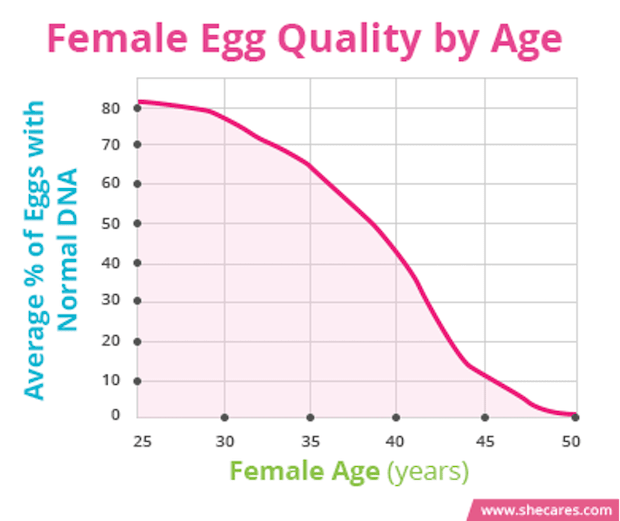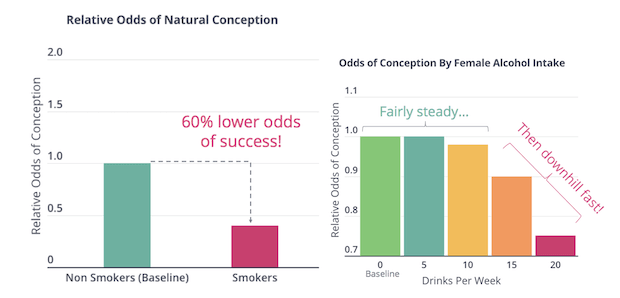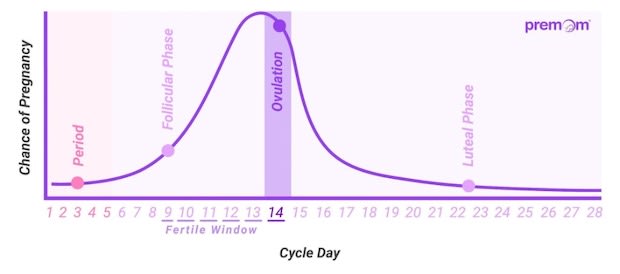Table of Contents
I. Egg Health and Fertility: What’s the Relationship?
II. How to Improve Egg Health for Fertility in 10 Steps
5. Limit Exposure to Environmental Toxins
9. Understand Your Menstrual Cycle
10. Consult a Fertility Specialist
Starting a family is a dream shared by many couples, but the journey to conception can be filled with challenges. Infertility impacts about 17.5% of the adult population. [1] Sometimes, it can be explained and treated, but other times a root cause evades even specialists. This is why so many women now want to know how to improve egg health for fertility proactively.
In this article, we’ll tell you how to do it. We’ll start by exploring the relationship between egg quality and fertility, then outline how to improve egg health through lifestyle changes and other intentional steps you can incorporate into your daily routine.
The recommendations we’ll share can increase your likelihood of a successful conception and giving birth to a healthy baby.
Quick Takeaways
- Egg quantity and quality both impact fertility. Both decline significantly as women age, especially after age 35.
- Proactive, daily efforts to enhance egg quality can improve your chances of conceiving successfully when you plan for it to happen.
- Simple ways to improve egg health for fertility include: a balanced diet, staying hydrated, regular exercise, limited exposure to toxins, and maintaining a healthy weight.
- Smoking and excessive alcohol consumption negatively impact egg health and fertility.
- If you have trouble conceiving, a reproductive specialist can help you find the root cause and address it through medical measures when needed.
Egg Health and Fertility: What’s the Relationship?
Egg health plays a pivotal role in determining a woman's fertility and her ability to conceive. Age is the primary factor in egg quality in most cases—it begins to decline fairly rapidly after age 30. [2]
Healthy eggs have the genetic integrity needed to form a robust embryo, and they increase the likelihood of successful implantation in the uterus. Poor egg quality, on the other hand, can result in chromosomal abnormalities and can make fertilization less likely or increase the risk of miscarriage. In other words: The younger you are, the healthier your eggs are. The healthier your eggs are, the more likely you are to conceive and experience a complication-free pregnancy and birth. Knowing how to improve egg health for fertility is a timely priority, then, for women and couples who want to start a family. The earlier you focus on egg health, the more easily you’ll conceive when you want to and plan for it to happen. It’s also important to note, however, that many women often become pregnant into their 40s and have perfectly healthy babies. The chance of complications is higher, but the steps that we outline in this article can also increase the likelihood of a successful pregnancy as you age. Let’s look at 10 ways you can start improving your egg health and enhancing fertility right away. Maintaining a well-balanced diet is fundamental for overall health at any time—reproductive health included. One way to start enhancing your egg health for fertility is to eat a balanced and nutrient-rich diet. Incorporate fruits, vegetables, whole grains, lean proteins, and healthy fats into your daily meals. Antioxidant-rich foods like berries, leafy greens, and nuts, in particular, help protect eggs from oxidative stress and damage, which can impact fertility rates. Adequate hydration is essential for maintaining optimal egg health. Water helps to transport nutrients to cells, including the developing eggs. Drink at least 8 glasses of water per day, and avoid excessive caffeine and alcohol consumption, which can contribute to dehydration. Chronic stress can disrupt hormonal balance and interfere with your reproductive function. Take daily steps to reduce stress when you can—things like getting enough sleep, breathing exercises, meditation, yoga, and spending time in nature. Taking time to relax and prioritizing your mental health have significant positive effects on your physical health, which can enhance egg health as well. Engaging in moderate and regular physical activity can enhance overall well-being and support reproductive health. That said, excessive or intense training can sometimes negatively impact egg health in certain situations, especially if it leads to irregular menstrual cycles. A good rule of thumb is to maintain a long-term exercise routine that suits your body and lifestyle. Then, when you start actively trying to conceive, talk to your doctor about a healthy and balanced exercise plan based on your current health and level of fitness. Environmental toxins and pollutants can harm egg health in a number of ways. Avoid exposure to harmful chemicals found in certain cleaning products, pesticides, and plastics. Opt for natural and organic products whenever possible. When you can, limit your exposure to radiation from devices like smartphones or computers. Being underweight or overweight can affect your hormonal balance and disrupt ovulation. Do your best to maintain a healthy weight through the steps we’ve already outlined to positively influence egg health and fertility. Smoking and excessive alcohol consumption have been linked to decreased fertility and lower egg quality. Smoking can decrease your chance of conception by an alarming 60%, according to some studies, and fertility declines significantly for women who have more than 10 drinks per week. [3] Both smoking and alcohol negatively impact male sperm quality, too. Quitting smoking and limiting alcohol intake are two of the simplest and most impactful ways to improve egg health and increase your likelihood of conception. Certain supplements are thought to aid in improving egg health and fertility. Consult with your doctor to determine if supplements such as folic acid, coenzyme Q10, vitamin D, and omega-3 fatty acids are suitable for you when you’re trying to conceive. You’re most likely to conceive during the follicular phase of your cycle, in the days leading up to ovulation. Know your menstrual cycle and identify your ovulation timing so you can maximize your chances of conception. Charting your cycle or using ovulation predictor kits can be beneficial. If you have been trying to conceive for an extended period without success, consider consulting a fertility specialist. They can conduct tests to assess egg health and provide personalized advice and treatment options. In the case that you’re experiencing fertility challenges, do your research and trust your provider to guide you in the right direction. When most women think about enhancing fertility, they think about addressing potential problems if and when they arise. But the steps we covered in this article can improve egg health proactively to prevent many problems from ever occurring. There are no surefire ways to ensure you’ll be able to conceive at a particular time, but taking the right steps to stay healthy and maintain the quality of your eggs can enhance your chances of conceiving successfully when you want it to happen. Did you know that women taking Menopur for fertility treatment can access up to 80% cost savings by ordering from MyDrugCenter? Visit our website to learn how you can save on this and other prescriptions. The information in the article is not meant to be used for treatment or diagnosis. It is designed for general awareness and for information purposes only. Always consult a medical professional for your specific healthcare needs.
How to Improve Egg Health for Fertility in 10 Steps
Prioritize a Balanced Diet
Stay Hydrated
Manage Stress
Regular Exercise
Limit Exposure to Environmental Toxins
Maintain a Healthy Weight
Avoid Smoking and Alcohol

Consider Supplements
Understand Your Menstrual Cycle

Consult a Fertility Specialist
Final Thoughts
